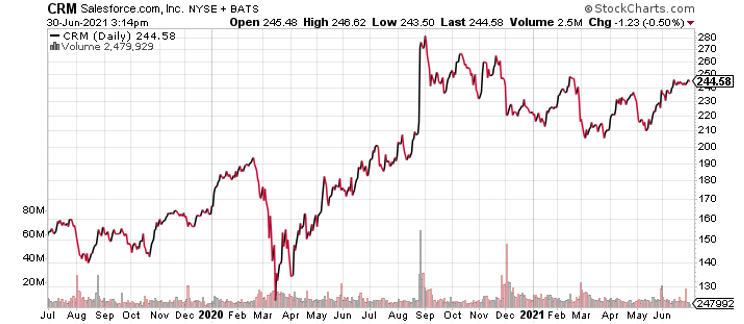Tech Companies Head to the Bond Market to Fund Acquisitions
In March, Verizon Communications Inc. (NYSE: VZ) raised $25 billion through corporate bonds. In May, Amazon (Nasdaq: AMZN) raised $19 billion. In fact, so far in 2021, just the top 10 biggest corporate bond sales total more than $141 billion.
This includes $15 billion by Bank of America Corp. (NYSE: BAC), $14 billion by Apple Inc. (Nasdaq: AAPL) and even $11 billion by 7-Eleven.
Borrowing costs are still cheap, so why wouldn’t companies continue tapping into the debt market?
On Tuesday, Salesforce.com, Inc. (NYSE: CRM) wrapped up an $8 billion bond sale to help fund its $28 billion acquisition of Slack Technologies, Inc. (NYSE: WORK).
This debt was broken up into parts with one portion having a maturity of 40 years! This is the largest acquisition that Salesforce has taken on. But the company expects this acquisition to fuel annual sales growth of more than 25%.
If you’re not familiar with the company, Salesforce is a leader in the customer relationship management (CRM) market.
CRM is the software and technology used for managing all of a company’s relationships. This includes interactions with customers, potential customers, service users, colleagues and suppliers.
CRM is one of the largest and fastest-growing enterprise application software categories. It’s logical that if you want your business to last, you’ll need to have efficient and reliable CRM systems.
It’s even more important in modern times because many — if not most — interactions are now digital. With a good system, these should be easier to track. Stronger relationships with customers and colleagues keep them happy.
There’s no question: The addition of Slack Technologies will enhance the Salesforce workplace communications platform to reach even more corporate employees.
If you haven’t used Slack, it’s a message board-style, cloud-based software that allows for communication among employees.
This combination of Salesforce’s customer and external communications with Slack’s internal communication functions just might be a game-changer for CRM.
Once the platforms are integrated, Salesforce will sprinkle in some artificial intelligence (AI) and machine learning to capture crucial information to streamline common processes for software users.
The ambition won’t stop there.
Salesforce is determined to improve and continue taking market share.
That’s a major reason why I was curious to see if the Weiss Rating changed for the company recently.
It’s important to remember that our unbiased model does not take into consideration investor sentiment; it’s focused on the numbers. So, I headed on over to the Weiss Ratings website to see how Salesforce was looking.
The company has a solid history of bouncing between “buy” and “hold” … and it’s even hit that “sell” rating a few times. But just two weeks ago, it was upgraded from “hold” to “buy.”
The upgrade reasoning showed an increase in earnings before interest and taxes (EBIT), net income and earnings per share (EPS).
Overall, things are looking good for Salesforce. Its Slack acquisition should close by the end of July, and it doesn’t have to pay back some of that money for 40 years.
Shares are up 10% in the past six months and 31% over the past year.
 |
Due to this, I got curious as to how some of the other companies in the CRM space were looking right now.
You can’t really talk about Slack without mentioning its major competitor: Microsoft Teams.
Microsoft Corp (Nasdaq: MSFT) is working hard to compete in the CRM space with its Dynamics 365 product.
It integrates easily into Office, Teams and LinkedIn, which are used by so many companies already. The expansion of Microsoft’s Azure Cloud service could make it a real competitor for Salesforce in the CRM realm.
In the most recent earnings, Dynamics products and cloud services rose 26% year over year. And Dynamics 365 revenue grew a whopping 45%.
We know that Microsoft is far from a pure CRM play, but let’s take a look anyway. The company has a solid “buy” rating and pays a reliable dividend. But the dividend yield is now below 1% yield based on the run-up of share prices. Shares are up 22% over the past six months, and in the last five years, Microsoft shares are up 475%.
Lastly, I took a look at German company SAP SE (NYSE: SAP), which controls roughly 18% of the CRM market. The company works to gain the edge for companies needing industry-specific processes and built-in compliance. It targets products for retailers, automotive companies, hospitals, banks and universities.
SAP pays a dividend of 1.14%. Shares are up 10% over the past six months, but only 3% over the past year. It currently has a “hold” rating.
These are just three companies worth noting in the CRM industry. It’s an industry that is expected to be worth over $100 billion in the next six years. You can bet I’m going to keep on watching.
You should, too.
Best,
Kelly Green

